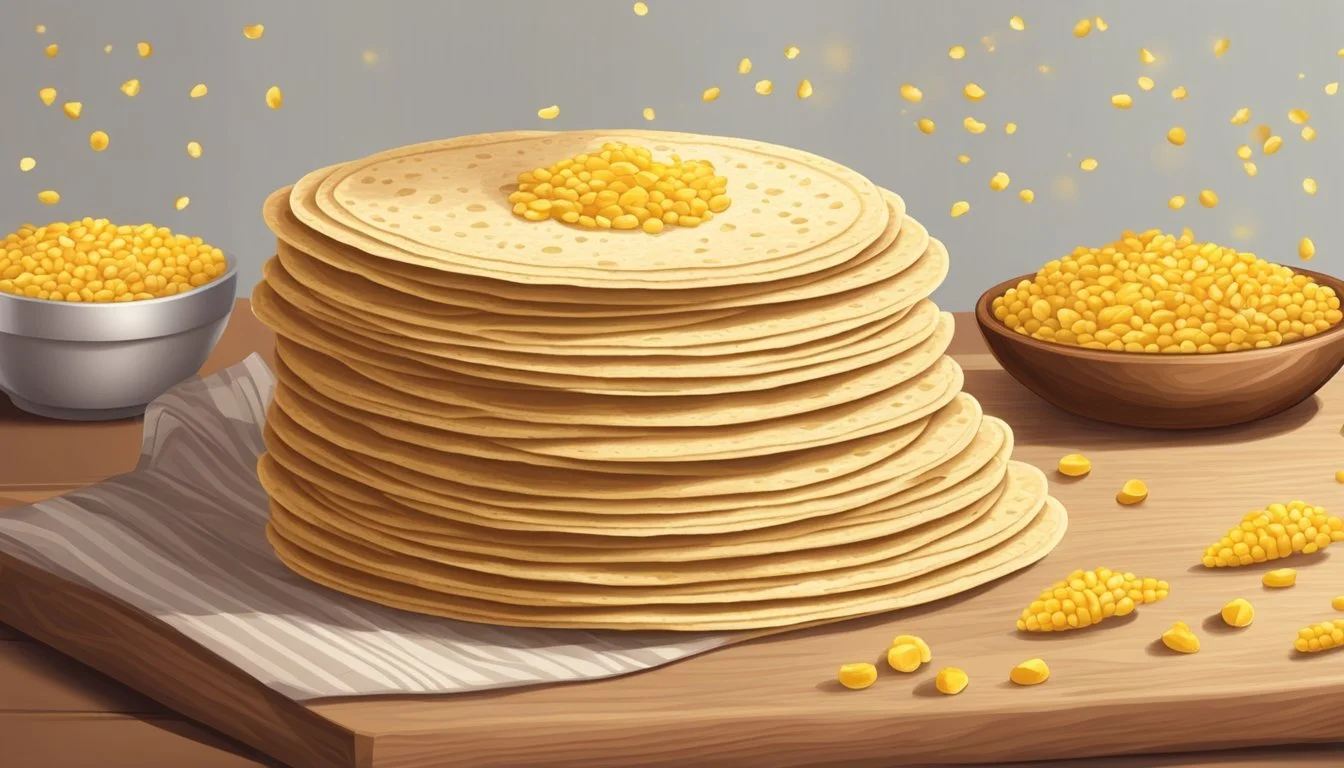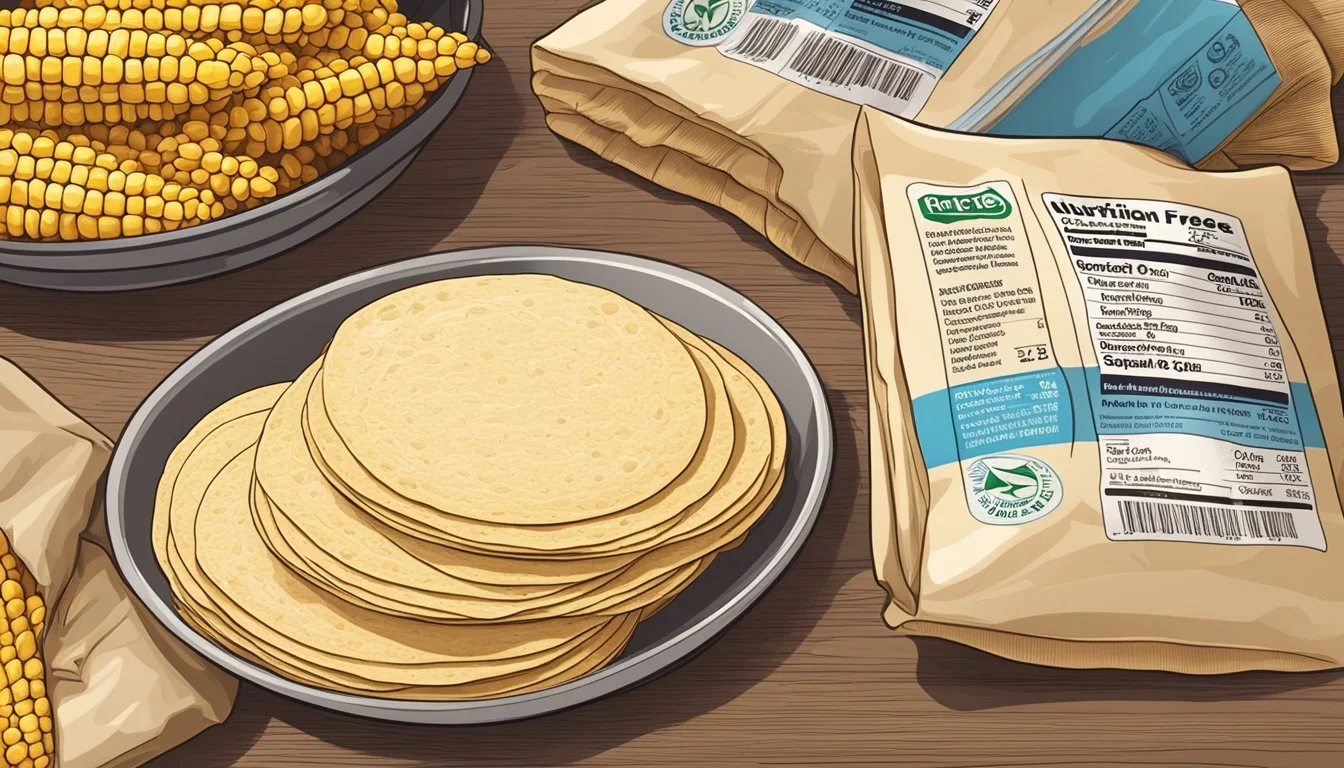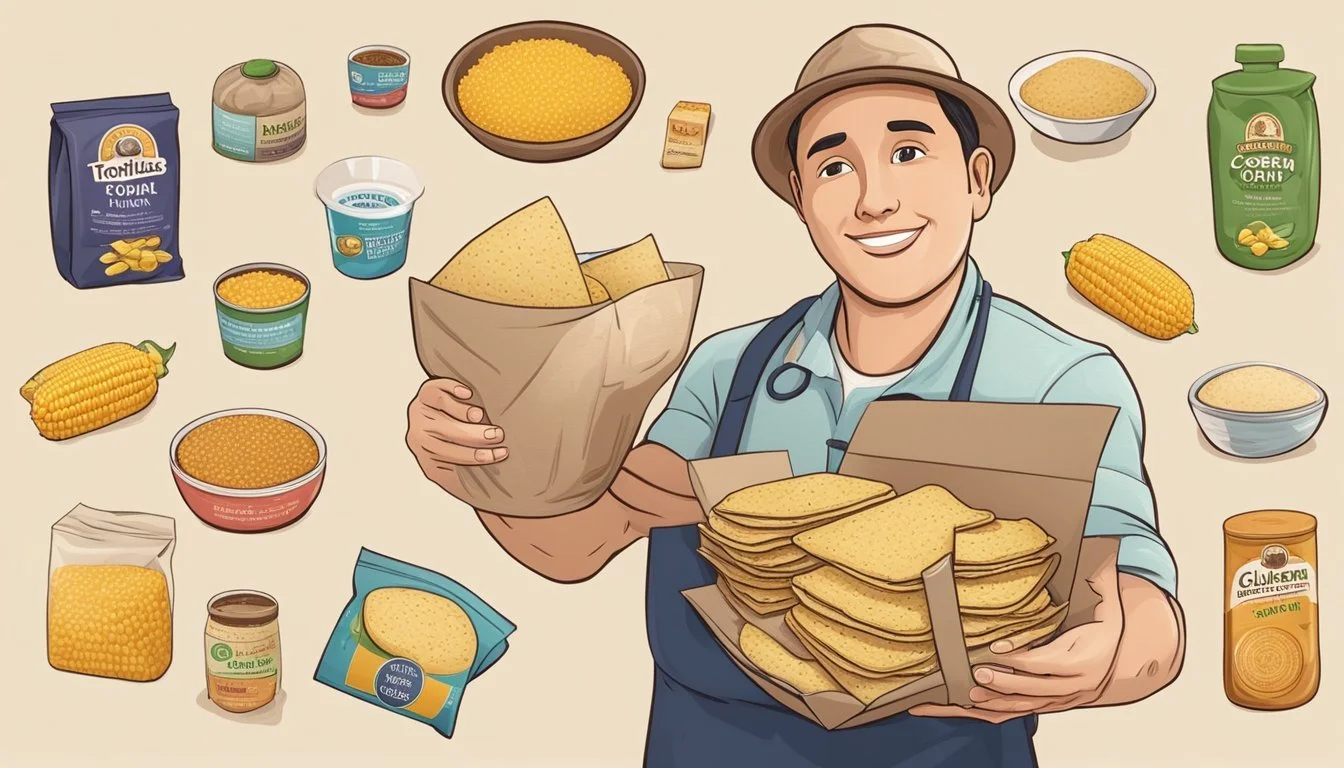Are Corn Tortillas Gluten-Free?
Unpacking the Facts for a Safe Diet
Corn tortillas are traditionally made from masa harina, a type of corn flour, and water, making them inherently gluten-free. Gluten is a group of proteins found in wheat, barley, and rye, which are hazardous to individuals with celiac disease or gluten sensitivity. Since corn does not contain gluten, corn tortillas are generally safe for those adhering to a gluten-free diet.
However, it is essential for consumers to exercise caution, as some brands may process corn tortillas in facilities that also handle gluten-containing grains, leading to potential cross-contamination. Additionally, certain manufacturers may include additives or preservatives that contain gluten in their corn tortilla recipes. Therefore, it is crucial for individuals on a gluten-free diet to review the product's ingredient list and verify if the tortillas have been certified gluten-free.
For the utmost safety, especially for those with serious gluten intolerances, purchasing brands that specifically label their corn tortillas as gluten-free can provide peace of mind. These brands take extra precautions to prevent cross-contamination and often test their products to ensure they meet gluten-free standards. Consumers can find gluten-free corn tortillas in most grocery stores, either in the gluten-free section, the international foods aisle, or from various online retailers.
What Are Corn Tortillas?
Corn tortillas are a staple in Mexican cuisine; they are thin, unleavened flatbreads made primarily from ground corn. They serve as the foundation for many traditional Mexican dishes and can vary in color and ingredients.
Ingredients and Basic Composition
Corn tortillas are composed of a simple mix of masa harina (a type of corn flour made from dried hominy), water, and often a pinch of salt. The dough, or "masa," is formed by combining these ingredients and is then pressed flat before cooking.
Corn Tortilla Varieties
There is a diversity in corn tortilla types, including yellow corn tortillas, white corn tortillas, and blue corn tortillas. Each offers a distinct flavor, color, and nutritional profile, catering to various preferences and recipes.
Traditional Corn Tortilla Making
Traditionally, homemade corn tortillas are prepared by kneading the masa and then pressing it using a tortilla press to create perfectly flat disks. These are then cooked on a hot surface until they are lightly toasted and flexible.
The Role of Corn Tortillas in Mexican Cuisine
In Mexican cuisine, corn tortillas are essential for many dishes such as tacos, enchiladas, quesadillas, and even tortilla chips. Their versatility and mild flavor make them a perfect vessel for a range of ingredients.
Commercial Brands and Availability
Popular brands like Mission, La Tortilla Factory, and Siete offer pre-made corn tortillas. These can be found in grocery stores, often in the gluten-free section or the international foods aisle, and may include organic corn tortillas.
Storing and Reheating
To maintain freshness, corn tortillas can be refrigerated or frozen. They are best reheated in a tortilla warmer or skillet to bring back flexibility and warmth, necessary for creating the perfect wrap or base for toppings.
Understanding Gluten
In exploring the relationship between corn tortillas and gluten, it's vital to comprehend what gluten is, its effects on health, and the importance of accurate labeling for those who follow a gluten-free diet.
What is Gluten?
Gluten is a protein composite primarily found in wheat, barley, and rye. It is responsible for the elasticity and chewiness seen in baked goods. In Mexican cooking, traditional flour tortillas contain gluten as they are made from wheat flour, while corn tortillas made from masa harina (a type of corn flour) usually do not.
Gluten and Health
For individuals with celiac disease, an autoimmune disorder, consuming gluten can cause damage to the small intestine. Others may have non-celiac gluten sensitivity, experiencing discomfort without the intestinal damage. A gluten-free diet is essential for these groups.
Gluten-Free Certification and Labeling
Gluten-Free Certification involves testing products to ensure they meet strict standards for gluten content. Proper labeling is crucial; the ingredient list on packaging informs consumers about the presence of gluten to avoid cross-contamination risks.
Alternative Gluten-Free Options
For those requiring a gluten-free diet, alternatives to gluten-containing foods are becoming more prevalent. Gluten-free corn tortillas are a popular substitute for flour tortillas, provided they're made from naturally gluten-free cornmeal or maseca brand masa harina corn flour.
Common Gluten-Containing Foods to Avoid
Individuals following a gluten-free diet typically avoid:
Breads containing wheat
Pastas made from wheat flour
Cereals with barley or rye
Crackers and biscuits containing wheat
Gluten-Free Grains and Flours
Several grains and flours meet gluten-free requirements:
Corn: Fresh, whole grain, or as cornmeal/masa harina
Rice: White, brown, or as flour
Quinoa: A versatile, protein-rich seed
Sorghum: Often used in gluten-free baking mixes
Navigating Gluten-Free Diets
Maintaining a gluten-free diet requires vigilance, especially when it comes to eating out or trying new foods. Consumers should:
Regularly check ingredient lists for gluten sources.
Be aware of cross-contamination potential, even with gluten-free products.
Opt for fresh, whole foods whenever possible to minimize risk.
Nutritional Profile of Corn Tortillas
Corn tortillas are a traditional Mexican food staple made primarily from masa harina, a type of corn flour. They serve as a versatile base for a variety of dishes and also provide essential nutrients as part of a balanced diet. The nutritional profile of corn tortillas encompasses their caloric content, macronutrient balance, and the vitamins and minerals they offer.
Caloric Content
A typical serving size of two corn tortillas, approximately 47 grams, generally contains around 100 calories. This calorie count can vary slightly depending on the brand or preparation method.
Macronutrients
The primary macronutrients in corn tortillas are carbohydrates, proteins, and fats. Here is a breakdown:
Carbohydrates: A serving of two corn tortillas has about 20 grams of total carbohydrates.
Fiber: Within those carbohydrates, corn tortillas contribute roughly 3 grams of dietary fiber, beneficial for digestive health.
Protein: They contain a modest amount of protein, usually around 2 to 3 grams per serving.
Fat: Corn tortillas are low in fat, with typically 1 to 1.5 grams per serving.
Vitamins and Minerals
Corn tortillas are a source of several vitamins and minerals, although not as abundant as some other food items. They provide:
Some B vitamins, particularly folate
Trace minerals like magnesium and potassium
A small amount of calcium and iron
Comparing Corn and Flour Tortillas
When analyzing corn versus flour tortillas, it's important to highlight that corn tortillas are naturally gluten-free, since they are not made from wheat, barley, or rye, and hence do not contain gluten. In contrast, flour tortillas are typically made from wheat, containing gluten, and may not be suitable for individuals with gluten sensitivities or celiac disease. Nutritionally, corn tortillas tend to be lower in calories and fat, but higher in fiber compared to flour tortillas. However, flour tortillas usually provide more protein.
How to Make Homemade Corn Tortillas
Making homemade corn tortillas is an accessible process that requires minimal equipment and ingredients. By following these steps, the reader can craft authentic, fresh tortillas that transcend the quality of store-bought varieties.
Essential Tools and Ingredients
To begin, one will need a tortilla press or a rolling pin for shaping, masa harina, which is a special corn flour, water, and salt. A griddle or hot skillet is crucial for cooking. For ease of removal and to prevent sticking, plastic wrap or parchment paper is recommended.
Ingredients:
2 cups masa harina
1/2 teaspoon salt
1.5 to 2 cups warm water
Tools:
Tortilla press or rolling pin
Griddle or skillet
Plastic wrap or parchment paper
The Cooking Process
Combine masa harina and salt in a bowl. Gradually add warm water, kneading until the dough is pliable. Separate the dough into walnut-sized balls, and use the tortilla press lined with plastic wrap to flatten them into discs. Heat the griddle and cook each tortilla for about 30 to 60 seconds on each side until they display golden brown spots.
Tips for the Perfect Tortilla
To achieve the perfect tortilla texture, ensure the dough is not too dry or too sticky. Dough should feel similar to play-doh. Let the dough rest for a few minutes before pressing. Pressing firm and even pressure on the tortilla press yields evenly shaped tortillas.
Creative Uses and Recipes
Homemade corn tortillas can be used for an array of dishes such as tacos, enchiladas, and quesadillas. They can also be cut and fried into chips, or shaped into cups for serving appetizers. Their versatility is a boon for any creative cook.
Storage and Freezing
Freshly made tortillas are best enjoyed immediately, stored in a tortilla warmer to retain warmth and moisture. To store, let them cool, then place them in a plastic wrap or airtight container. For longer storage, they can be frozen. Layer the tortillas between sheets of parchment paper and place them in a sealable bag, squeezing out as much air as possible before freezing.
Buying Guide for Corn Tortillas
When shopping for corn tortillas, considering gluten content is critical for those with gluten intolerances or celiac disease. Consumers should also assess tortilla quality, authenticity, and suitability for specific dietary needs while considering where to find the best options.
Choosing the Right Tortilla
Choosing the right type of corn tortilla can enhance any meal. Tortillas come in diverse varieties:
White Corn Tortillas: Mild in flavor and softer in texture, they're versatile for various dishes.
Yellow Corn Tortillas: They have a slightly earthier taste and are ideal for a heartier bite.
Blue Corn Tortillas: Richer and nuttier, these can offer a gourmet twist to traditional recipes.
Label Reading for Gluten Content
To ensure tortillas are gluten-free, read labels for:
Primary Ingredients: Masa harina or corn masa should be listed, both made from ground corn.
Certification: Look for gluten-free certification logos.
Cross-Contamination Warnings: Even if made with gluten-free ingredients, cross-contamination during manufacturing could pose a risk.
Spotting Quality and Authenticity
The quality of corn tortillas can vary greatly. For authenticity:
Check for a simple ingredient list, which typically includes corn masa and water.
Organic Corn Tortillas may provide a purer corn flavor and fewer additives.
Options for Specialty Diets
Some consumers may require dairy-free or other specialty diet options. Brands like Siete and La Tortilla Factory offer varieties that cater to these needs, such as tortillas made with almond or chickpea flour. It's important to read labels for these dietary accommodations.
Where to Purchase
Corn tortillas are readily available at:
Grocery Stores: Common chains and local markets. Look in the gluten-free or international foods aisle.
Specialty Stores: For more authentic or unique options, such as Del Campo or Vista Hermosa.
Convenience can also be found via:
Online Retailers: A broad selection with the convenience of home delivery.
Use store locators on brand websites to find the nearest retail options.
Eating Corn Tortillas on a Gluten-Free Diet
Corn tortillas are a practical choice for those adhering to a gluten-free diet, suitable for any meal from breakfast to dinner. They serve as a versatile ingredient for various dishes, ensuring that individuals with celiac disease or gluten sensitivity can enjoy a range of flavors while maintaining their dietary restrictions.
Incorporating Corn Tortillas into Meals
Corn tortillas can be a staple in gluten-free cooking, accommodating a wide array of fillings and toppings. For breakfast, one might fill them with scrambled eggs and avocado. Come lunch, a corn tortilla wrap with grilled chicken and fresh vegetables makes for a nutritious option. At dinner, they are ideal for constructing enchiladas or tacos, with options such as black beans, cheese, or seasoned beef.
Benefits and Considerations
Corn tortillas are inherently gluten-free, which is beneficial for individuals with celiac disease or gluten sensitivities. They provide flexibility in a gluten-free diet, allowing for the enjoyment of foods that would typically involve wheat tortillas. However, it's important to note that not all corn tortillas are created equal – some might be processed in facilities that also handle wheat, introducing a risk of cross-contamination.
Avoiding Cross-Contamination
To maintain a truly gluten-free diet, careful kitchen practices must be observed. Always verify that corn tortillas are labeled "gluten-free" to mitigate the risk of cross-contamination. Additionally, use separate utensils and surfaces when preparing gluten-free products, and consider dedicated appliances like toasters to ensure safety.
Sourcing Gluten-Free Tortilla Products
Finding authentic gluten-free corn tortillas is essential. Brands such as Siete, Food for Life, Guerrero, and Mi Rancho offer certified gluten-free options. Below is a list of recommended gluten-free tortilla brands known for their quality, which provide safe choices for those on a strict gluten-free diet:
Siete: Offers a variety of gluten-free tortillas, including those made from almond flour.
Food for Life: Features tortillas made from sprouted grains, which are both gluten-free and nutritious.
Guerrero: A brand that provides traditional corn tortillas, confirmed to be gluten-free.
Mi Rancho: Delivers organic corn tortillas that cater to the gluten-free market.
When purchasing tortillas, one should read product labels thoroughly to ensure they align with gluten-free requirements.





